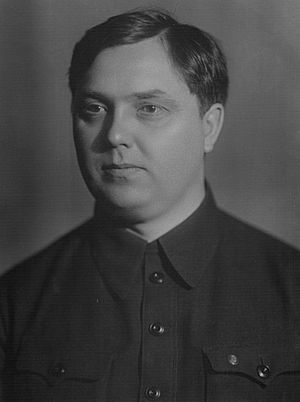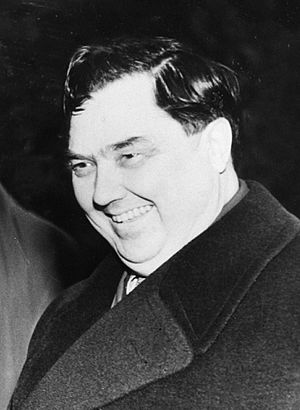Georgy Malenkov facts for kids
Quick facts for kids
Georgy Malenkov
|
|||||||||||||||||||||||
|---|---|---|---|---|---|---|---|---|---|---|---|---|---|---|---|---|---|---|---|---|---|---|---|
|
Георгий Маленков
|
|||||||||||||||||||||||
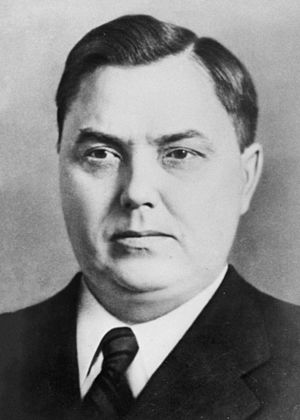
Malenkov in 1964
|
|||||||||||||||||||||||
| 5th Premier of the Soviet Union | |||||||||||||||||||||||
| In office 6 March 1953 – 8 February 1955 |
|||||||||||||||||||||||
| President | |||||||||||||||||||||||
| First Deputies |
|
||||||||||||||||||||||
| Preceded by | Joseph Stalin | ||||||||||||||||||||||
| Succeeded by | Nikolai Bulganin | ||||||||||||||||||||||
| Deputy Premier of the Soviet Union | |||||||||||||||||||||||
| In office 9 February 1955 – 29 June 1957 |
|||||||||||||||||||||||
| Premier | Nikolai Bulganin | ||||||||||||||||||||||
| In office 2 August 1946 – 5 March 1953 |
|||||||||||||||||||||||
| Premier | Joseph Stalin | ||||||||||||||||||||||
| In office 15 May 1944 – 15 March 1946 |
|||||||||||||||||||||||
| Premier | Joseph Stalin | ||||||||||||||||||||||
| Second Secretary of the Communist Party of the Soviet Union | |||||||||||||||||||||||
| In office 31 August 1948 – 16 October 1952 |
|||||||||||||||||||||||
| Preceded by | Andrei Zhdanov | ||||||||||||||||||||||
| Succeeded by | Nikita Khrushchev (de facto) | ||||||||||||||||||||||
|
|||||||||||||||||||||||
| Personal details | |||||||||||||||||||||||
| Born |
Georgy Maximilianovich Malenkov
6 December 1901 Orenburg, Russian Empire |
||||||||||||||||||||||
| Died | 14 January 1988 (aged 86) Moscow, Russian SFSR, Soviet Union |
||||||||||||||||||||||
| Resting place | Kuntsevo Cemetery, Moscow | ||||||||||||||||||||||
| Citizenship | Soviet | ||||||||||||||||||||||
| Political party | Communist Party of the Soviet Union (Stalinists, 1956–1957) (1920–1961) | ||||||||||||||||||||||
| Domestic partner | Valeriya Golubtsova (1920–1987) | ||||||||||||||||||||||
| Children | 3 | ||||||||||||||||||||||
| Alma mater | Moscow Highest Technical School | ||||||||||||||||||||||
| Profession |
|
||||||||||||||||||||||
| Religion | Atheist convert to Russian Orthodox | ||||||||||||||||||||||
Georgy Malenkov (born December 6, 1901 – died January 14, 1988) was an important Soviet politician. He briefly became the leader of the Soviet Union after Joseph Stalin died. However, other powerful leaders in the government wanted to share power.
Malenkov gave up his role as head of the Communist Party. But he remained the Premier, which is like a prime minister. He was seen as the "first among equals" in the Soviet leadership. Later, he had a power struggle with Nikita Khrushchev. This led to him losing his position as Premier in 1955. He was removed from the top leadership group in 1957.
Malenkov's connections to Vladimir Lenin helped him rise in the Communist Party of the Soviet Union. By 1925, he was in charge of the party's records. This brought him close to Stalin, who was then the leader of the Soviet Union. Malenkov was involved in some difficult events during Stalin's time. Later, he was put in charge of the Soviet missile program during World War II.
After Stalin's death in 1953, Malenkov became both the Premier and the head of the Communist Party. But just nine days later, he was asked to give up his party leadership role. He stayed as Premier, but Nikita Khrushchev became the main party leader. Malenkov was forced to resign as Premier in 1955. In 1957, he tried to remove Khrushchev from power, but he failed. Malenkov was then sent away to Kazakhstan. He was later removed from the Communist Party in 1961 and retired from politics.
Contents
Early Life and Education
Georgy Malenkov was born in Orenburg, which was part of the Russian Empire. His family came from a region called Ohrid in what is now North Macedonia. Some of his ancestors were officers in the Imperial Russian Army. His father was a successful farmer. Malenkov sometimes helped his father with his business. His mother's family included a blacksmith and an Orthodox priest.
Malenkov finished school in Orenburg just before the Russian Revolution in 1917.
Political Career
In 1918, Malenkov joined the Red Army as a volunteer. He fought with the Communists against other groups in the Russian Civil War. He became a member of the Communist Party of the Soviet Union (CPSU) in 1920. During the Civil War, he worked as a political commissar on a propaganda train.
Joining the Communist Party
After the Russian Civil War, Malenkov quickly became known as a strong Communist. He moved up in the Communist Party. In the 1920s, he became a Communist secretary at the Moscow Higher Technical School. Instead of finishing his studies, Malenkov chose a career in Soviet politics. His university degree was never completed.
In 1924, Stalin noticed Malenkov and gave him a job in the party's main office. By 1925, Malenkov was working in the Organizational Bureau of the Central Committee of the CPSU.
Malenkov was responsible for keeping records on all Communist Party members. He oversaw the creation of two million files over ten years. This work brought him very close to Stalin. He was involved in the difficult trials that removed many people from the party. In 1938, he helped remove Nikolai Yezhov, the head of the secret police. In 1939, Malenkov became the head of the party's personnel department. This gave him control over who worked in the party. He also became a full member of the Orgburo and a Secretary of the Central Committee. In February 1941, Malenkov became a candidate member of the Politburo, a very high-ranking group.
Role in World War II
After Germany invaded in June 1941, Malenkov was promoted to the State Defense Committee (SDC). This committee included other powerful figures like Lavrenty Beria, Kliment Voroshilov, and Vyacheslav Molotov. Stalin was the head of the committee. This small group controlled all political and economic life in the Soviet Union during World War II. Malenkov became one of the five most powerful men.
From 1941 to 1943, Malenkov's main job in the SDC was to oversee the production of military aircraft. He also supervised the development of nuclear weapons. In 1943, he led a committee for rebuilding areas damaged by the war.
Soviet Missile Program
Stalin gave Malenkov the important job of building nuclear missiles with Beria. Malenkov was made Chief of the Soviet Missile program. His main assistant was Dmitry Ustinov, a young rocket scientist. During World War II, Malenkov, Ustinov, and Mikhail Khrunichev started the Soviet missile and rocket program. They even brought German missile technology from Peenemünde to Moscow. This work later led to the creation of Vostok missiles and the orbiting of Sputnik. Malenkov also oversaw the building of space centers like Kapustin Yar and the Khrunichev State Research and Production Space Center.
Malenkov's main role was to supervise the top scientists and engineers. He focused on finding talented young people from universities. He looked for people with strong technical skills who could invent and build weapons quickly. He cared more about their skills than their political beliefs. This showed that economic and technological progress was very important for the country.
After the War: Political Struggles
After the war, there was a focus on strict communist ideas called "Zhdanovshchina." This was led by Andrei Zhdanov, who disagreed with Malenkov. Malenkov believed in the importance of science and engineering. He wanted to promote experts in technology to high positions. Zhdanov thought that correct political ideas were more important than science.
However, the technology experts had been very successful during the war. They had improved industrial production and developed advanced weapons. Malenkov, the technologists, and other leaders opposed Zhdanov's ideas. Zhdanov then focused on controlling arts and culture instead.
Dealing with War Heroes
Georgy Zhukov was a very famous Soviet military commander during World War II. He won important battles like the Siege of Leningrad and the Battle of Stalingrad. Stalin, Beria, and Malenkov became suspicious of Zhukov. They worried he was too friendly with Western leaders, like General Dwight D. Eisenhower from the United States.
After World War II, Malenkov spoke out against several Soviet war heroes, including Zhukov. Malenkov accused Zhukov of acting against the revolution. Zhukov was then moved to a less important position. After this, Malenkov gained more power and became closer to Stalin. In 1946, Malenkov became a candidate member of the Politburo. After Andrei Zhdanov's death in 1948, Malenkov became even more favored by Stalin. That same year, he became a Secretary of the Central Committee.
Removing Competitors
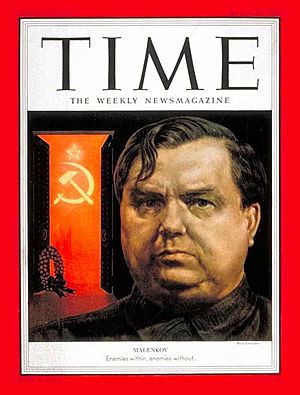
In the late 1940s and early 1950s, Malenkov became Stalin's most favored person. His main rivals were the leaders of Leningrad. These leaders had gained much fame for their resistance during the Siege of Leningrad in World War II. Malenkov followed Stalin's plan to reduce Leningrad's fame. This was to make sure Moscow remained the only center of power.
In 1949, Malenkov went to Leningrad with armed forces. He arrested the city's leaders. After secret trials, 23 men, including the mayor, were executed. Over two thousand other important people were sent away from Leningrad to Siberia. Their property was taken, and their jobs were given to people loyal to Stalin.
Malenkov also oversaw the removal of the Jewish Anti-Fascist Committee. Many members were killed. On August 12, 1952, thirteen Jewish writers were executed in a prison. This was approved by Stalin and supervised by Malenkov.
Malenkov's actions showed his loyalty to Stalin. This made him the most likely person to take over after Stalin. Time magazine covers in 1952 and 1953 showed Malenkov as Stalin's chosen successor.
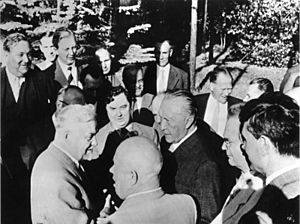
Malenkov's political efforts paid off when Joseph Stalin died on March 5, 1953. Four days later, Malenkov, Vyacheslav Molotov, Lavrenty Beria, and Nikita Khrushchev spoke at Stalin's funeral.
On March 6, Malenkov became the Premier. His name was also listed first in the new Presidium of the Central Committee. This showed that he had taken over as the party leader as well. However, after only a week, Malenkov was asked to resign from his party leadership role. The new leaders wanted to prevent one person from having too much power. Khrushchev effectively replaced him as party leader. Malenkov remained as Premier, and this began a period of shared leadership between Malenkov and Khrushchev.
Malenkov was Premier for two years. During this time, he was also involved in a power struggle within the Kremlin. Malenkov spoke against the development of nuclear weapons. In 1953, he started an international campaign for peace. He said that a new world war with modern weapons would mean "the end of world civilization." He always supported peaceful solutions in diplomacy.
On economic matters, Malenkov wanted to focus on making consumer goods instead of just heavy industry. His goal was to improve the lives of people in the Soviet Union. He also supported policies for agriculture. These included tax cuts for farmers and higher prices paid by the state for grains. These policies were put in place but did not fully meet their goals and were expensive. This caused Malenkov's influence to decrease.
Later Years and Retirement
Malenkov was forced to resign in February 1955. He was criticized for misusing his power and for his close ties to Beria, who had been executed in 1953. He was also blamed for slow reforms, especially in freeing political prisoners. His economic plan to focus on consumer goods was stopped. Instead, more money was put into heavy industry.
For two more years, Malenkov remained a member of the Presidium. In 1956, he traveled with Khrushchev to Yugoslavia. They informed Josip Broz Tito about the upcoming Soviet invasion of Hungary.
However, in 1957, Malenkov tried to remove Khrushchev from power. This attempt failed. Malenkov, along with Vyacheslav Molotov and Lazar Kaganovich, were removed from the Politburo. Khrushchev called them the "Anti-Party Group". In 1961, Malenkov was removed from the Communist Party and sent to Kazakhstan. He became a manager at a hydroelectric plant in Oskemen.
After being sent away, Malenkov became less known. He felt sad about losing his power. However, he later found his new life a relief from the stress of Kremlin politics. In his later years, Malenkov became a member of the Russian Orthodox Church. His daughter also converted and used some of her money to build churches. Church publications said that Malenkov was a reader (a low-level church worker) and a choir singer in his final years.
Personal Life
In 1920, Malenkov began living with Soviet scientist Valeriya Golubtsova. They were never officially married. Valeriya had a direct connection to Vladimir Lenin through her mother. This connection helped both Valeriya and Malenkov in their careers. Valeriya later became the director of the Moscow Power Engineering Institute, a center for nuclear power research. They had two sons and one daughter.
Death
Georgy Malenkov died on January 14, 1988, in Moscow. He was 86 years old. He was buried at Kuntsevo Cemetery.
Honors and Awards
- September 30, 1943:
- Hero of Socialist Labour
- Order of Lenin
- 1945: Order of Lenin (second time)
- 1952: Order of Lenin (third time)
How Others Saw Him
The 1952 Time magazine cover showed Malenkov with Stalin. In 1954, a group from the British Labour Party visited Moscow. The British Ambassador, Sir William Goodenough Hayter, asked to meet with Nikita Khrushchev. To his surprise, Khrushchev agreed and brought other important leaders, including Malenkov.
This meeting was very interesting to British politicians. Sir Winston Churchill even asked Sir William Hayter to tell him all about it. Malenkov seemed "easily the most intelligent and quickest to grasp what was being said." He spoke "no more than he wanted to say." He was described as a "pleasant" person at the table with a "pleasant, musical voice." Malenkov even quietly suggested that a British translator should read novels by Leonid Andreyev, an author whose books were not popular in the USSR at the time.
Nikita Khrushchev, on the other hand, seemed "loud, impulsive, talkative, and surprisingly unaware of foreign affairs." Hayter thought Khrushchev had trouble understanding some ideas, and Malenkov had to explain things to him simply. Because Malenkov seemed to be in charge, the British group focused their efforts on him. Malenkov "spoke the best Russian of any Soviet leader I have heard," and his "speeches were well-organized and logical." He seemed like "a man with a more Western-orientated mind."
Portrayals in Media
Jeffrey Tambor played Malenkov in the 2017 movie The Death of Stalin. In the film, Malenkov is shown as shy and gentle. This is different from how British diplomats described him.
Images for kids
See also
 In Spanish: Gueorgui Malenkov para niños
In Spanish: Gueorgui Malenkov para niños
 | John T. Biggers |
 | Thomas Blackshear |
 | Mark Bradford |
 | Beverly Buchanan |


